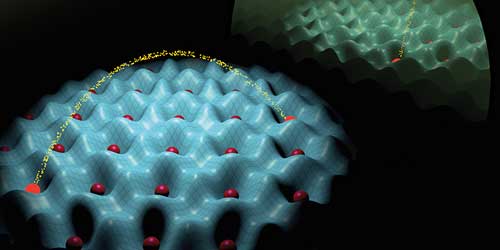One thing about Quntum; nothing ever stays consistent. Why it’s loved & hated by Cyber Security enthusiasts as well as AI engineers.
When water in a pot is slowly heated to the boil, an exciting duel of energies takes place inside the liquid. On the one hand there is the interaction energy that wants to keep the water molecules together because of their mutual attraction. On the other hand, however, the motional energy, which increases due to heating, tries to separate the molecules. Below the boiling point the interaction energy prevails, but as soon as the motional energy wins the water boils and turns into water vapour. This process is also known as a phase transition. In this scenario the interaction only involves water molecules that are in immediate proximity to one another.
An artificial quantum world of atoms and light: Atoms (red) spontaneously arrange themselves in a checkerboard pattern as a result of the complex interplay between short- and long-range interactions. (Visualizations: ETH Zurich / Tobias Donner)
A team of researchers led by Tilman Esslinger at the Institute for Quantum Electronics at ETH Zurich, and Tobias Donner, a scientist in his group, have now shown that particles can be made to “feel” each other even over large distances. By adding such long-range interactions the physicists were able to observe novel phase transitions that result from energetic three-way battles (“Quantum phases from competing short- and long-range interactions in an optical lattice”).
